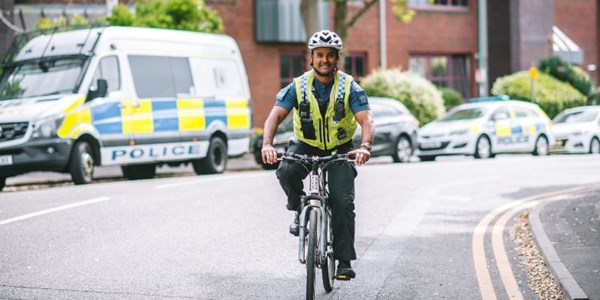Police Community Support Officer
The role of PCSO is challenging and rewarding where you will be involved in many varied situations and work with an array of other officers and staff throughout the organisation.
Below are some answers to frequently asked questions.

PCSOs do not have powers of arrest, can only investigate minor offences, and do not carry out the more complex and high-risk tasks that Police Officers can perform.
You do need any formal qualifications to become a PCSO, however your English should be proficient.
There is no requirement to hold a driving licence. As a PCSO, you will generally be carrying out patrols on foot or bicycle.
This will depend on the locations for the vacancy. If you are successful, there is no guarantee you will be posted to your hometown, however you will be posted within 30 miles of your home address.
There is currently no direct progression route from PSCO to PC, however if you have 18 months satisfactory service as a PCSO, you will not be required to meet the Level 3 qualification requirement to apply as a Police Officer.
You welcome applications from those wishing to work part-time, however you will be required to work full-time during the initial training period. Any requests to work part-time will be reviewed in line with the Force Flexible Working Policy and with operational need. If you are employed on a part-time basis, your salary will be calculated pro-rata, to reflect your working hours.
As a PCSO, some of your time will be spent patrolling on your own. There will likely be occasions when you will patrol with other PCSOs, Constables and Sergeants, as part of your neighbourhood policing team. You may also get the opportunity to work with Special Constables and members of other warden schemes.
The starting salary for a PCSO is £26,106 per annum, plus a 12.5% shift allowance and claimable allowance for weekend working. Your salary will rise on a yearly basis, to a maximum of £28,653 per annum. You will be paid on a monthly basis, on 28th of each month.
The minimum annual leave entitlement for a full-time employee is 23 days per financial year (April-March). This rises by 5 days after five years of employment. Bank holidays are in addition to annual leave. Leave is calculated on a pro-rata basis for part-time employees.
Devon and Cornwall
If you reside outside of 30 miles from Force HQ Middlemoor you may be able to request accommodation on site.
Dorset
There is no accommodation on site. You will need to make your own arrangements to and from HQ Winfrith.
- Is there an upper age-limit to apply?
No – you must be 18 or over at the point of application, but there is no maximum age restriction.
- I have a medical condition – will this prevent me from applying?
We welcome applications from everyone, however please be aware that you will be subject to a medical. Your suitability for the role will be assessed by our Occupational Health team, in line with the National Medical standards and you will need to be deemed fit to proceed, in order to progress to appointment.
For further information on the national standards, please see here
Yes – you will be provided with a uniform once in post.
You will have a radio, possibly a mobile phone and a protective vest. As PCSOs are not used to carry out potentially confrontational duties, you won’t use handcuffs, batons or incapacitant sprays.
No – You will spend over 80 per cent of your time on foot or cycle patrol. You can only build links with the public by being accessible and familiar to them.
